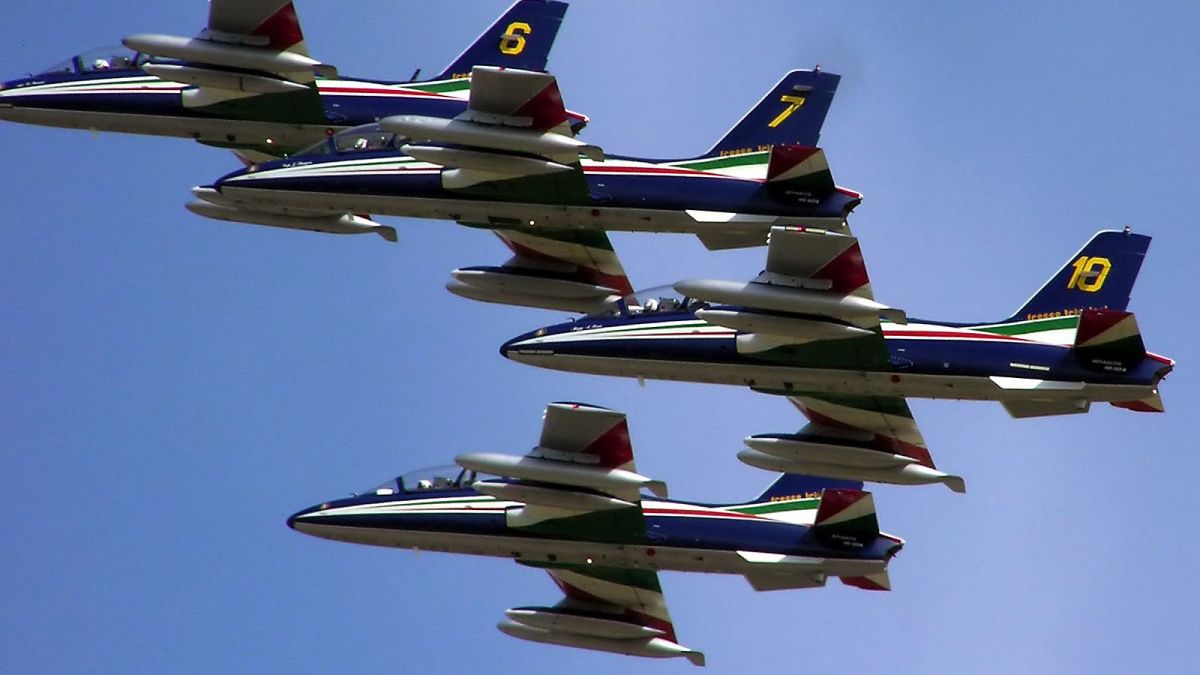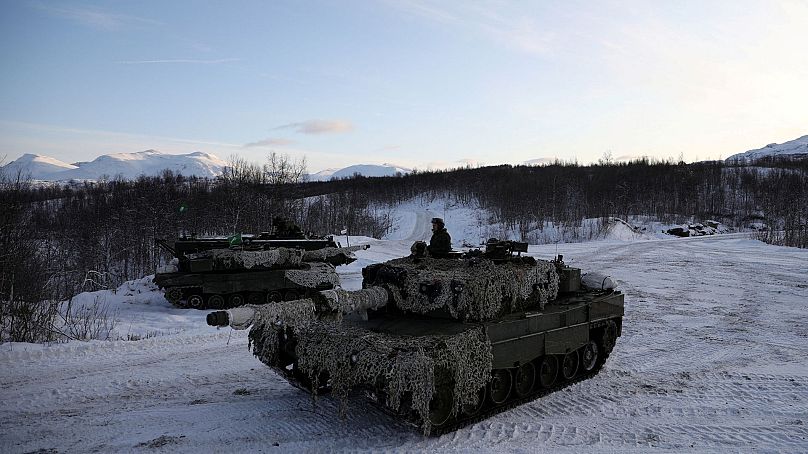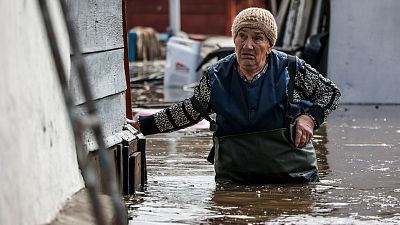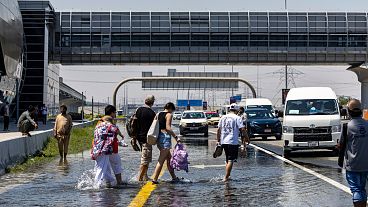Militaries account for an estimated 5.5% of global greenhouse gas emissions, but they are not obliged to report their carbon footprints.
When it comes to assessing global emissions, the world's armed forces are usually overlooked.
As temperatures hit new highs, scientists and environmental groups are stepping up pressure on the UN to force armies to disclose all their emissions. A long-standing exemption has kept some of their climate pollution off the books.
Among the world's biggest consumers of fuel, militaries account for 5.5 per cent of global greenhouse gas emissions, according to a 2022 estimate by international experts.
But defence forces are not bound by international climate agreements to report or cut their carbon emissions. And the data that is published by some militaries is unreliable or incomplete at best, scientists and academics say.
Campaigners for more data received a boost this week as MEPs called on the Commission, the Council and the EU foreign affairs chief to "formulate a proposal for the transparent accounting of military emissions to the UNFCCC." The call was part of the parliament's annual climate crisis resolution ahead of COP28.
Resolutions are not legally binding and are generally considered as political statements that allow the Parliament to express its opinion on issues.
The issue was also highlighted in a new report from the UN Environment Programme published on Monday.
It said: “Direct emissions from military operations, vehicles and installations are likely non-trivial, but remain insufficiently accounted [for]."
“It's one paragraph in a 108 page report but this is an incredibly welcome step," the Conflict and Environment Observatory wrote on X, formerly known as Twiiter.
Why don't armed forces have to report their emissions?
Military emissions abroad, from flying jets to sailing ships to training exercises, were left out of the 1997 Kyoto Protocol on reducing greenhouse gases. They were also exempted from the 2015 Paris accords. This was on the grounds that data about energy use by armies could undermine national security.
The carbon footprint of EU military expenditure in 2019 was approximately 23 million tonnes of CO2 equivalent, according to estimates by The Conflict and Environment Observatory.
This is equivalent to the annual CO2 emissions of about 14 million average cars. The group says this is a conservative estimate.
With the highest military spending in the EU, France was found to contribute approximately one-third of the total carbon footprint for the EU’s militaries.
The carbon footprint of the UK military expenditure in 2018 was estimated at 10 million tonnes of CO2 equivalent in a report by Scientists for Global Responsibility (SGR).
Environmental groups are pushing for military emissions reporting
Emissions accounting will come into focus in the first global stocktake - an assessment of how far behind countries are from the Paris climate goals - due to take place at the COP28 climate summit in the United Arab Emirates starting on 30 November.
"The omission of conflict-related emissions in UNFCCC accounting is a glaring gap," says Axel Michaelowa, founding partner of Perspectives Climate Group, adding that hundreds of millions of tons of carbon emissions may be unaccounted for.
Are militaries doing anything to address their emissions?
There are signs, however, that some militaries are preparing for changes in their reporting requirements in the coming years, while others are making strides to cut their climate impact.
NATO, the 31-country Western security alliance which includes 21 EU states, for example, says it has created a methodology for its members to report their military emissions.
Countries such as New Zealand are exploring whether to add previously excluded areas, such as emissions from overseas operations, while Britain and Germany are looking to address grey areas in their reporting, defence officials said.
And Washington sent US Army and Navy representatives to the COP27 climate summit in Egypt last year, the first time a Pentagon delegation has attended the global climate summit.
"What I think that signified is that we are part of the conversation, we are certainly emitters when it comes to fossil fuels and energy," says Meredith Berger, assistant secretary for energy, installations and environment at the US Navy and one of the Pentagon delegates.
Drones could help curb military emissions
The US military's oil use and emissions are falling.
The US Defence Logistics Agency, which oversees oil buying, said 84 million barrels were purchased in 2022, down almost 15 million from 2018. Emissions in 2022, meanwhile, fell to 44 million tonnes from 46 million the previous year.
The US Department of Defense said those figures included all emissions, but that it stripped out international transport and bunker fuels from the numbers reported to the UNFCCC.
Neta Crawford, a professor of international relations at Oxford University, said US troop withdrawals from Afghanistan and Iraq, the adoption of renewable energy technologies, more fuel-efficient vehicles, as well as fewer and smaller military exercises, had contributed to the declines in the fuel use.
The wider use of drones may also have helped.
"One of the biggest emissions reduction technologies has been the used of unmanned aerial vehicles - drones," a senior US defence official who wished to remain anonymous told news agency Reuters. "When you take a human out of the aircraft, you get dramatically improved energy performance."
How is the war in Ukraine affecting military emissions?
Groups lobbying the UN to lift the military exemptions point to a surge in emissions related to the Ukraine conflict as a good reason for the change.
"Ukraine has absolutely brought the spotlight onto this issue in a way that other conflicts have not," says Deborah Burton at environmental group Tipping Point North South.
A report from Dutch carbon accounting expert Lennard de Klerk estimated the first 12 months of the war in Ukraine will trigger a net increase of 109 million tonnes of greenhouse gases, equivalent to the annual output of Singapore, Switzerland and Syria combined.
Ukraine's environment ministry spokesperson said it supports the efforts and would seek backing from governments at COP28 for more transparent military emissions reporting.
'The military gets a free ride'
While the Ukraine war has heightened the focus among climate activists on military emissions, some experts say it is a distraction for governments focused on regional security, and that could slow discussions in the near term.
"It's important to understand the Ukraine crisis has made this a little bit more complicated," says James Appathurai, NATO's deputy assistant secretary general for emerging security challenges.
Some militaries say publishing details on their oil use would be a window into their overseas operations.
"We would not want to let everybody know how much fuel we use in these missions - how far we fly, how far we drive, and what our exercise patterns are," says Markus Ruelke, from the German defence ministry's environmental protection unit.
Some military emissions are recorded under unspecified fuel combustion in the UN's reporting tables, the UNFCCC says.
In the meantime, global military emissions will remain poorly understood, says Stuart Parkinson, executive director of the group Scientists for Global Responsibility.
"It's all very well telling people to stop flying or switch to an electric car, whether that's an expense or inconvenience to them, but it's hard to do that when the military gets a free ride," he says.




